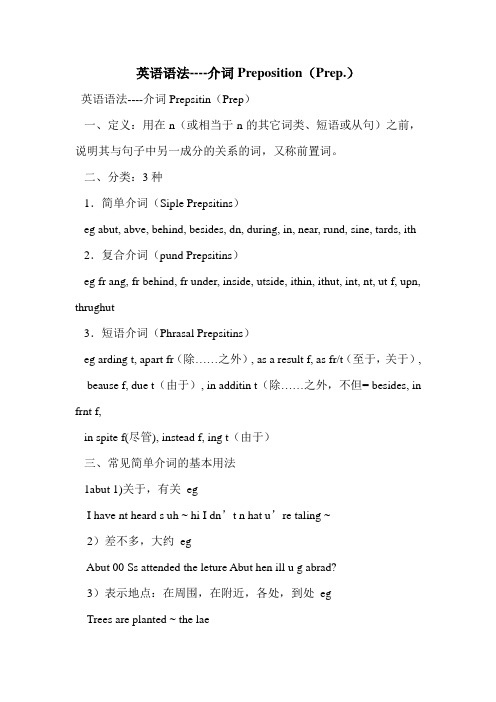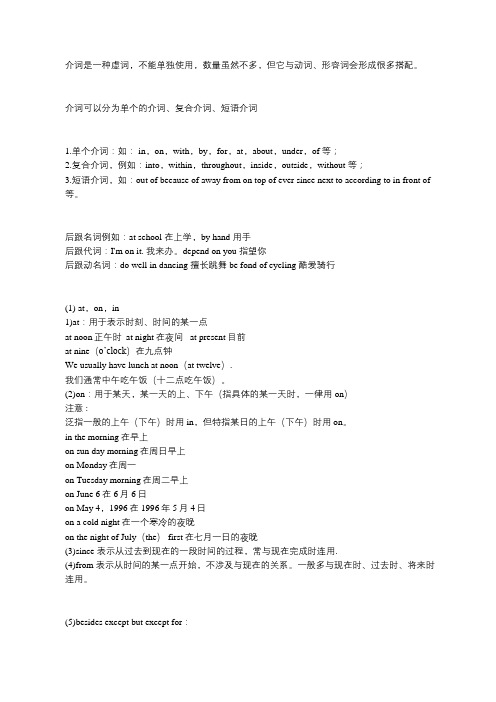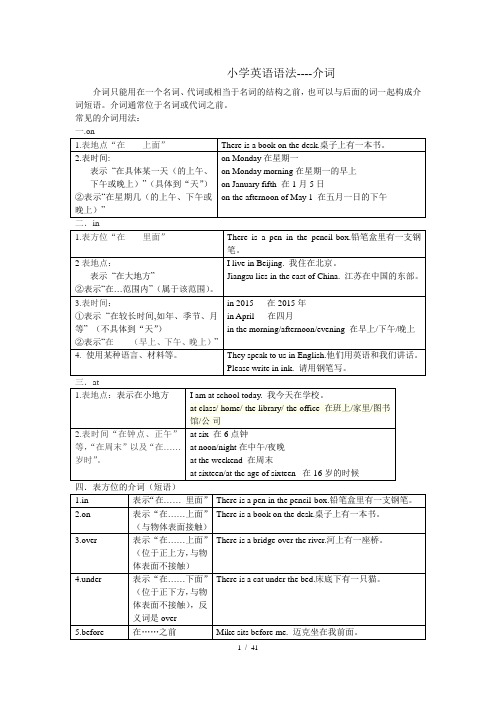英语语法--介词
小学英语语法-介词

小学英语语法-介词介词的定义介词是一种表示名词或代词与其他词之间关系的词类。
它可以表示时间、地点、方式、原因等关系。
常见的介词以下是小学英语中常见的介词及其用法:in:表示在某个地点或某个范围内。
例如:in the park(在公园里)、in the morning(在早上)。
in:表示在某个地点或某个范围内。
例如:in the park(在公园里)、in the morning(在早上)。
in:表示在某个地点或某个范围内。
例如:in the park(在公园里)、in the morning(在早上)。
on:表示在某个表面或某个特定日期。
例如:on the desk(在桌子上)、___(在星期一)。
on:表示在某个表面或某个特定日期。
例如:on the desk(在桌子上)、___(在星期一)。
on:表示在某个表面或某个特定日期。
例如:on the desk(在桌子上)、___(在星期一)。
at:表示在具体的时间或某个地点。
例如:at 7 o'clock(在7点)、___(在学校)。
at:表示在具体的时间或某个地点。
例如:at 7 o'clock(在7点)、___(在学校)。
at:表示在具体的时间或某个地点。
例如:at 7 o'clock(在7点)、___(在学校)。
to:表示向某个地点或某个目标。
例如:go to the supermarket (去超市)。
to:表示向某个地点或某个目标。
例如:go to the supermarket(去超市)。
to:表示向某个地点或某个目标。
例如:go to the supermarket(去超市)。
from:表示从某个地点或某个时间开始。
例如:___(从星期一到星期五)。
from:表示从某个地点或某个时间开始。
例如:___(从星期一到星期五)。
from:表示从某个地点或某个时间开始。
例如:___(从星期一到星期五)。
by:表示通过某种方式或某个工具。
英语语法----介词Preposition(Prep.)

英语语法----介词Preposition(Prep.)英语语法----介词Prepsitin(Prep)一、定义:用在n(或相当于n的其它词类、短语或从句)之前,说明其与句子中另一成分的关系的词,又称前置词。
二、分类:3种1.简单介词(Siple Prepsitins)eg abut, abve, behind, besides, dn, during, in, near, rund, sine, tards, ith 2.复合介词(pund Prepsitins)eg fr ang, fr behind, fr under, inside, utside, ithin, ithut, int, nt, ut f, upn, thrughut3.短语介词(Phrasal Prepsitins)eg arding t, apart fr(除……之外), as a result f, as fr/t(至于,关于), beause f, due t(由于), in additin t(除……之外,不但= besides, in frnt f,in spite f(尽管), instead f, ing t(由于)三、常见简单介词的基本用法1abut 1)关于,有关egI have nt heard s uh ~ hi I dn’t n hat u’re taling ~2)差不多,大约egAbut 00 Ss attended the leture Abut hen ill u g abrad?3)表示地点:在周围,在附近,各处,到处egTrees are planted ~ the laeThe live sehere~ the Peple’s SquareDn’t leave ur bs~ ur des I haven’t an sall hange ~/n e 4)“即将”(近期将)egThe fil is ~ t begin It’s nearl 7:00 The train is ~ t leave2abve 1)在……上方egA bird is fling abve the ds There is a prtrait abve the blabard 2)(在数量上)超过egThe an is nt et frt, but ell ~thirtThe nuber f ne Ss this ear is ~fur hundred3)(能力等)胜过,超越;因太困难、太好而不…… eg The prble is ~ e (这问题太难我不懂。
英语语法----介词Preposition(Prep.)

英语语法----介词Preposition(Prep.)英语语法----介词Prepsitin(Prep)一、定义:用在n(或相当于n的其它词类、短语或从句)之前,说明其与句子中另一成分的关系的词,又称前置词。
二、分类:3种1.简单介词(Siple Prepsitins)eg abut, abve, behind, besides, dn, during, in, near, rund, sine, tards, ith 2.复合介词(pund Prepsitins)eg fr ang, fr behind, fr under, inside, utside, ithin, ithut, int, nt, ut f, upn, thrughut3.短语介词(Phrasal Prepsitins)eg arding t, apart fr(除……之外), as a result f, as fr/t(至于,关于), beause f, due t(由于), in additin t(除……之外,不但= besides, in frnt f,in spite f(尽管), instead f, ing t(由于)三、常见简单介词的基本用法1abut 1)关于,有关egI have nt heard s uh ~ hi I dn’t n hat u’re taling ~2)差不多,大约egAbut 00 Ss attended the leture Abut hen ill u g abrad?3)表示地点:在周围,在附近,各处,到处egTrees are planted ~ the laeThe live sehere~ the Peple’s SquareDn’t leave ur bs~ ur des I haven’t an sall hange ~/n e 4)“即将”(近期将)egThe fil is ~ t begin It’s nearl 7:00 The train is ~ t leave2abve 1)在……上方egA bird is fling abve the ds There is a prtrait abve the blabard 2)(在数量上)超过egThe an is nt et frt, but ell ~thirtThe nuber f ne Ss this ear is ~fur hundred3)(能力等)胜过,超越;因太困难、太好而不…… eg The prble is ~ e (这问题太难我不懂。
小学英语语法详解---介词(表示地点的介词)

小学英语语法详解介词——表示地点的介词1) 表示地点(包括动向)的介词① at, in, on, toat表示在小地方:I arrive at school at nine every morning.我每天早上九点到校。
表示“在……附近,旁边”The Smiths are at the beach.史密斯一家在沙滩上。
in表示在大地方:When did you arrive in Beljing?你什么时候到北京的?表示“在……范围之内”:The penclis in the pencl-box.铅笔在铅笔盒里。
on表示毗邻,接壤,“在………上面”Mongolia is on the north of China.蒙古在中国的北面。
表示在某物体上面并与之接触:He put his watch on the table.他把手表放桌上。
to表示“在……范围外”不强调是否接壤:或“到……”:Japan is to the east of China.日本在中国的东面。
②above, overabove指“在……上方”,不强调是否垂直,与below相对:The bird is flying above my head.鸟儿在我头顶上飞过。
over指垂直的上方,与under相对,over有覆盖的含义在里面:There is a bridge over the river.江上有座桥。
③below, underunder表示“在……正下方”:There is a cat under the table.桌子下面有只猫。
below表示“在……下方”,不一定在正下方:Please write your name below the line.请在线的下方写上您的名字。
④in front of, in the front ofin front of“在……前面”,指甲物在乙物之前,两者互不包括:其反义词是behind (在……的后面):There are some flowers in front of the house.房子前面有些花卉。
英语语法 介词

英语语法介词介词是虚词,介词不能单独作句子成分,只能用在名词、代词或作用相当于名词的其他词、词组或从句之前,与之一起构成介词短语充当句子成分。
介词在英语中用得极为广泛、灵活,可组成许多成语和习惯用法,因此学习时要特别注意。
1.介词的种类(1)简单介词on,in,with,by,for,about等(2)合成介词into,out of,as for,without(3)短语介词by means of,because of,according to,in respect of,in contrast with,in spite of(4)分词介词including,concerning,considering,regarding,provided,given2.介词短语介词短语是由介词和构成介词短语的那部分名词或相当于名词的其他词或短语构成的。
主要有下列几种:(1)介词+名词Aluminum and zinc can easily combine with the oxygen in the air. 铝和锌很容易与空气,户的氧化合。
(2)介词+代词How much luggage can I take with me?我能带多少行李?(3)介词+动名词You learn to speak English by speaking it. 你用说英语这种方式来学说英语。
(4)介词+数词Everything divides into two. 事物都是一分为二的。
(5)介词+另一个介词短语The air was removed from between the two pipes. 空气已从两管之间抽出。
(6)介词+形容词或副词It is far from satisfactory.We have made some progress,but it is far from enough.我们已经取得了一些进步,但还远远不够。
介词,英语语法-词类4

for表示“去”目的地方向, 常与leave, bound, depart, set out, start连用。 We are leaving for Guangzhou tomorrow. 我们明天去广 州。 to表示 “到达”动作的目的地,常与fly, walk, drive, come, go, return, move, run等连用, 和shout, throw连用表示动作 的对象。 They ran to the hospital and shouted to me. 他们跑到医院 朝我大喊。 towards表示 “朝…方向”, 没有到达之意. They ran towards the hospital. 他们朝医院跑去。(跑向) from表示动作的起点 “从…” Her uncle has returned from India.她叔叔从印度回来了。
17
表示 “除了”的介词 besides “除…外”(还有, 其余相同), 具有肯定 性质, 常和more, else, other, another 等连用。 What else did you do besides writing the letter? except (but) “除…外再没有”, 不包括在范围内 具有否定性质。常与no, none, all等词连用。 We study all subjects except arts. except for “除了有…外”, for后的内容与前面 不同类或是前面内容的一部分。 Your composition is good except for a few spelling mistakes. except that +从句 Your composition is good except that there are a few spelling mistakes.
初中英语语法-介词

介词是一种虚词,不能单独使用,数量虽然不多,但它与动词、形容词会形成很多搭配。
介词可以分为单个的介词、复合介词、短语介词1.单个介词:如: in,on,with,by,for,at,about,under,of 等;2.复合介词,例如:into,within,throughout,inside,outside,without 等;3.短语介词,如:out of because of away from on top of ever since next to according to in front of 等。
后跟名词例如:at school 在上学,by hand 用手后跟代词:I'm on it. 我来办。
depend on you 指望你后跟动名词:do well in dancing 擅长跳舞be fond of cycling 酷爱骑行(1) at,on,in1)at:用于表示时刻、时间的某一点at noon正午时 at night在夜间 at present目前at nine(o’clock)在九点钟We usually have lunch at noon(at twelve).我们通常中午吃午饭(十二点吃午饭)。
(2)on:用于某天,某一天的上、下午(指具体的某一天时,一律用on)注意 :泛指一般的上午(下午)时用in,但特指某日的上午(下午)时用on。
in the morning在早上on sun day morning在周日早上on Monday在周一on Tuesday morning在周二早上on June 6在6月6日on May 4,1996在1996年5月4日on a cold night在一个寒冷的夜晚on the night of July(the) first在七月一日的夜晚(3)since 表示从过去到现在的一段时间的过程,常与现在完成时连用.(4)from 表示从时间的某一点开始,不涉及与现在的关系。
小学英语语法--介词

小学英语语法----介词介词只能用在一个名词、代词或相当于名词的结构之前,也可以与后面的词一起构成介词短语。
介词通常位于名词或代词之前。
常见的介词用法:一.on二.in四.表方位的介词(短语)练一练用适当的介词填空1.My father begins work ________ 8:00 ________ the morning .2.Do the students stay ________ home ________ Saturday?3.My mother cut the cake ________ a knife4.We live______ a new house now.5.Shanghai is ____ the east of China.6. I usually have lunch ____ noon.7. It’s eight o’clock. It’s time ________ class.8. _____ half past six , he usually has dinner.9. We have lessons _____eight o’clock ___ twelve o’clock.10.I go there _____ my friend _____ bike.11.There is a bridge_____ the river.12.This is a photo _____ my family.13.Tom comes _____ England.14.My bed is _____ the window.15.He looks_____ his father.16.What's this _____ English?17.The pen is_____ the pencil-box.18. The bookstore is_____ the right of our school.19.There are some pictures _____ the wall.20.My telephone is _____the bed and the sofa.答案:1. at; in 2.at; on 3.with 4. in 5.in 6.at 7.for 8.At 9.from; to 10. with; by 11. over 12. of 13. from 14. near 15. like 16. in 17. in 18. on19.on 20.between。
- 1、下载文档前请自行甄别文档内容的完整性,平台不提供额外的编辑、内容补充、找答案等附加服务。
- 2、"仅部分预览"的文档,不可在线预览部分如存在完整性等问题,可反馈申请退款(可完整预览的文档不适用该条件!)。
- 3、如文档侵犯您的权益,请联系客服反馈,我们会尽快为您处理(人工客服工作时间:9:00-18:30)。
(一)介词的定义:介词是一种用来表示词与词,词与句之间的关系的词。
(二)介词的分类:i.时间介词in:早午晚年月季E.g.in the morning,in 2018,in January,in springon:具体日期,某一天的上下午晚上E.g.on August 8th ,2008;on morning of August 8th ,2008;on a cold nightat:午夜点与分E.g.at night,at noon,at 8o’clockii.方位介词on,inover,under,above,below一、语法总结iii.易混介词in front of,in the front of在……前面behind,in the back of在……后面between,among在……中间二、语法练习Ⅰ.随堂测一、客观题(请在APP作答)1.We can have dinner____7o'clock.A./B.inC.onD.at2.We are going to have a meeting at9:00____Monday morning.A.onB.inC.byD.at3.My friend,Henry,was born____June10th,1997.A.inB.onC.atD.for4.—When were you born,Lucy?—I was born____November11th,1994.A.atB.onC.forD.in5.Jerry goes to the swimming class____Saturday afternoons.A.inB.atC.onD.for6.The aeroplane is flying____the village.A.overB.onC.underD.off7.Tom told me his parents had arrived____Beijing.A.atB.onC.inD.to8.There is a boy____the water.A.onB.inC.betweenD.of9.Music has become a bridge____the East and the West.A.inB.atC.amongD.between10.The driver sits____the bus.A.in front ofB.in the front ofC.behindD.front二、主观题(需用拍照提交至APP,由辅导老师批改)1.Christmas is______the25th of December.2.We are going to meet____half past ten.3.He left home____a cold winter evening.4.We live____a new house now.5.The workers will build a new railroad______the two cities.Ⅱ.拓展练习(补充练习题,不需要提交)1.The western people usually have a good time with friends____Christmas Day.A.atB.inC.ofD.on2.—Lucy,where were you born?—I was born____Shanghai.A.atB.inC.onD.by3.My brother was born____the morning of July8th,2005.A.inB.atC.onD.of4.It’s very nice to have some tea____Saturday afternoon.A.inB.onC.atD./5.It is very late,do not go out____.A.in the morningB.at nightC.in the afternoonD.in evening6.Over10,000runners joined a half and a mini marathons in Xianlin,Nanjing____May7,2017.A.inB.onC.atD.by7.Wow!Ten students in our class will celebrate their fourteenth birthdays____October!A.inB.onC.atD.to8.—When is the concert?—It's____three o'clock____the afternoon of July18th.A.at;inB.at;onC.on;inD.in;on9.Mike often reads newspapers_____seven_____the evening.A.at,atB.at,inC.in,inD.in,at10.The Blacks came to China_____June10th,2005.A.onB.atC.inD.of11.He arrived_____Guangzhou_____noon.A.in;atB.at;atC.at;inD.in;in12.I’m going to see him____November.A.onB.inC.atD.of13.There is a desk____the blackboard.A.in frontB.in the front ofC.in front ofD.in the front14.The Mother's Day is____the second Sunday in May in the United States.A.onB.inC.atD.of15.There are three pens____the desk.A.inB.onC.byD.of16.We arrived____the station five minutes late.A.atB.inC.onD.towards17.Einstein,the famous scientist,was born____March,1879.A.atB.onC.inD.to18.The accident happened____a cold winter morning.A.inB.onC.atD.of19.They arrived______Shanghai______a cold morning.A.in;inB.in;onC.at;onD.at;in20.We usually have a nap____noon in the office.A.onB.withC.inD.at拓展练习答案解析1.【答案】D【解析】考查介词。
节日若是Day,表示具体某天,一般用on,如on Christmas Day,但要注意是at Christmas。
故选D。
2.【答案】B【解析】考查介词的用法。
句意:—Lucy,你在哪里出生?—我出生在上海。
在某处用in。
故选B。
3.【答案】C【解析】考点:考查介词的用法。
句意:我的弟弟出生于2005年7月8日的上午。
具体到某一天的早晨、下午、晚上用介词on。
故答案为C。
4.【答案】B【解析】句意:在星期六下午喝茶非常好。
根据句意及题干分析具体到某一天的上午、下午和晚上要用介词on,故选B。
5.【答案】B【解析】试题分析:考查短语辨析。
句意:太晚了,晚上不要出去。
根据It is very late可知答案为B。
At night意为在晚上,在夜里;in the morning意为早上;in the afternoon意为在下午;没有in evening的搭配。
故选B。
6.【答案】B【解析】考查介词。
具体某一天用介词on,故选B。
7.【答案】A【解析】考查介词辨析。
月份前面用“in”,答案为A。
句意:哇!十月份,我们班将有10个学生要庆祝他们的14岁生日。
8.【答案】B【解析】考查介词辨析。
在具体时间点前用“at”;在具体某一天的早、中、下午用“on”,答案为B。
句意:音乐会是什么时候?7月18号下午三点。
9.【答案】B【解析】句意“迈克经常在晚上七点看报纸”,表示具体时刻,须用介词at;表示“在早上/中午/晚上”用介词in,故选B。
10.【答案】A【解析】句意为“布莱克斯一家在2005年6月10号来中国”,谈到具体的某一天用介词on,故选A。
11.【答案】A【解析】句意“他中午到达了广州”,表示大地点用介词in,广州为大地点;表示“在中午”用at noon,故选A。
12.【答案】B【解析】月份前用in作为时间介词。
13.【答案】C【解析】考查介词短语。
in front of和in the front of均表示“在前面”。
in front of表示在外部的前面,而in the front of表示在内部的前面。
故选C。
14.【答案】A【解析】在第二个周日,具体到天用介词on。
15.【答案】B【解析】考查固定搭配。
on the desk在桌子上16.【答案】A【解析】考查介词的固定搭配。
arrive in+大范围地点,arrive at+小范围地点,arrive at the station到达车站为固定搭配,句意为:我们迟到5分钟到达了车站。
故选A。
17.【答案】C【解析】考查固定搭配。
be born in为固定搭配,意为“出生于……”。
句意为“著名科学家爱因斯坦出生于1879年三月。
”故选C。
18.【答案】B【解析】考查介词的用法。
在具体的某个早上,要用介词on,选B。
19.【答案】B【解析】arrive in接大地点(≥区);“早中晚”前或后有修饰词时,不用in,用on。
20.【答案】D【解析】at noon是固定搭配,故选D。
